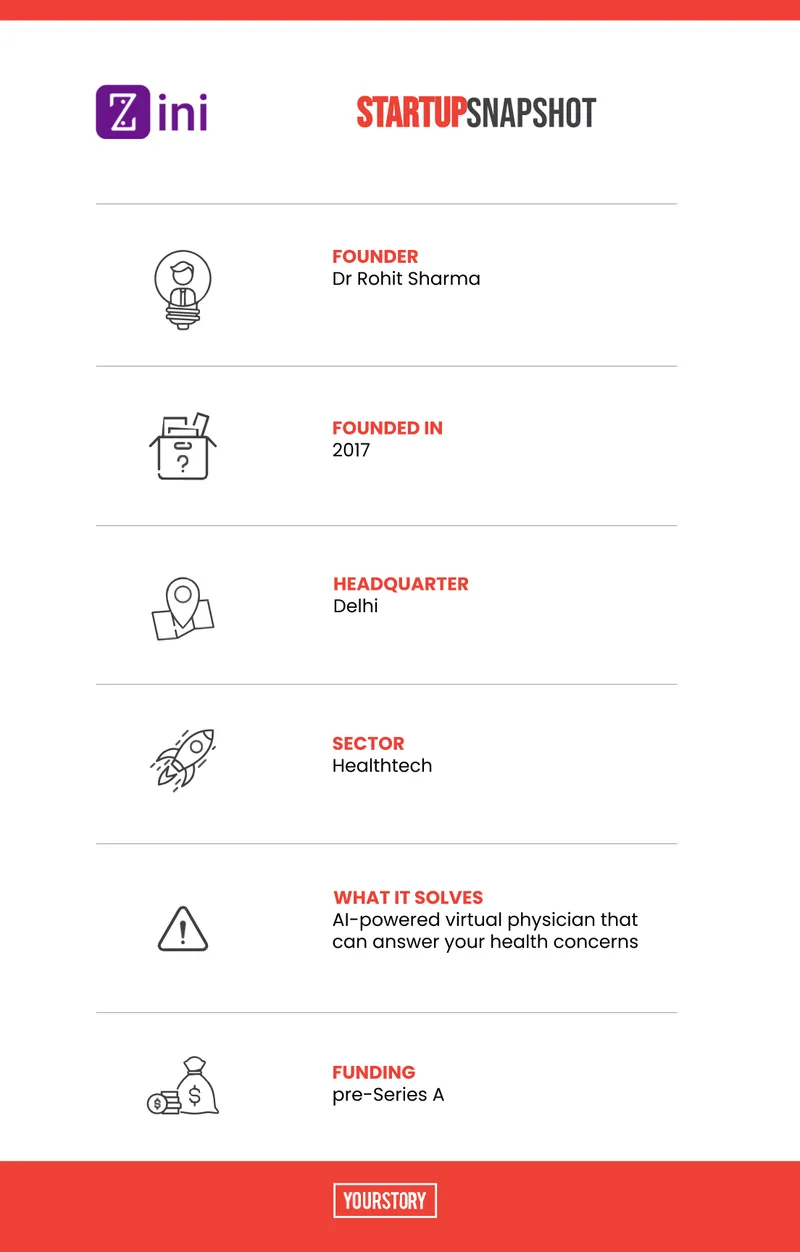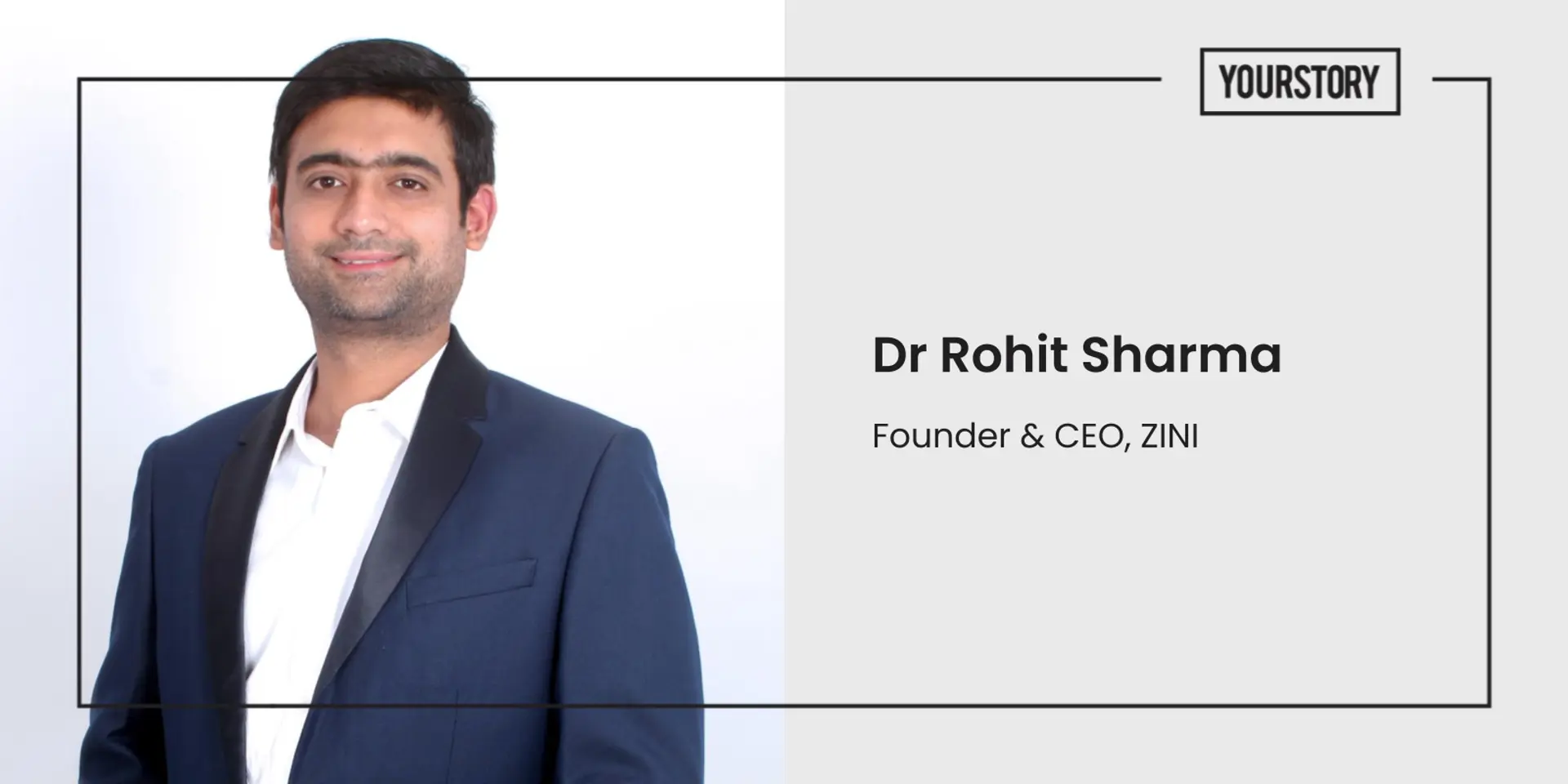This AI-powered healthtech startup is a virtual physician to answer all your health concerns
Founded by Dr Rohit Sharma in May 2017, Delhi-based ZINI is an AI-based virtual physician trained on medical data. Last month, the healthtech startup raised pre-Series A funding from Solarus Group, a London-based VC and PE firm.
The importance of family doctors was increasingly felt during the coronavirus pandemic when people started becoming more concerned about their health. But in the absence of family doctors, who do we approach during medical emergencies?
As per a recent report, the doctor-patient ratio in India currently stands at 1:1,445, which is lower than WHO recommendation of 1:1000. In government hospitals, there is one doctor for every 10,000 patients. There are PHCs (primary health centres) with no doctors at all.
The lack of genuine medical advice at the right time can be detrimental for a patient. To solve these challenges, Dr Rohit Sharma came up with , a flagship product of Delhi-based GRAINPAD Pvt Ltd.
Founded in May 2017, the healthtech startup is an AI-powered, voice-based virtual physician that provides medical guidance and directs patients to seek timely medical help.
According to Rohit, ZINI can address the gap in doctor-patient ratio in India. ZINI can also help gather structured data, which can promote research and help policymakers make data driven decisions about their communities.
How does it work?
Accessible through an app, ZINI allows users to ‘talk to ZINI’ about any medical symptom or health issues. With an Alexa-like experience, the app can evaluate 950+ health symptoms, 300+ diseases, provide a detailed report, recommend the course of action and share details of nearby medical facilities that a patient can reach out to.
When a patient calls a doctor, the doctor usually tries to figure out why they have a fever. “There are 200+ causes of fever. Until the doctor does not know “Why” the patient has a fever, they cannot advise further course of action. By talking to the patient, the doctor tries to extract more information to know the exact cause of the fever. This interview process is called ‘History taking’ a.k.a ‘patient interview’ step in clinical care. Only after this thorough interview can the doctor determine what is the cause of these symptoms and what is the ideal course of action,” Dr Rohit tells YourStory.
ZINI is a virtual intelligence that can automate the process of ‘history taking’. It is a ‘history taking’ bot, he says.

As shown in the figure above, ZINI automates this step and tries to figure out what is the probable diagnosis and guides patients further based on the situation.
“So far, in all of human history, only human doctors could do this. This is because the interview process requires three things -- knowledge (of medical science), intelligence, and intuition (from experience). But today, using the power of Data and AI, this process can be replicated by virtual agents like ZINI,” Rohit says.
“This technology is incorporated in various products. Some of those include ZINI the Android App, an OPD Management system, a medical API, and a 5-minute clinic system,” he adds.
The products and business model
The startup works on both B2B and B2C models. B2B refers to hospitals where ZINI offers the following products:
Medical API/SDK ‘Plug n Play’ Service: Hospitals can easily integrate ZINI into their existing apps and website to provide a ‘Symptom Checker’ option to the patients.
OPD Management System: Hospitals can also use ZINI to make information more organised and data-driven. Instead of just waiting idle, patients can complete their ‘Interview with ZINI’ while waiting and all the information is then shown to the doctors in their dashboard. Prescriptions to follow-ups, everything is available on-screen.
On the B2C side, the ZINI app can discuss symptoms and provide hyper-personalised advice for patients. These include:
ZINI the healthcare AI: The app lets patients talk to ZINI about all sorts of health issues. It’s a complete virtual health guide.
Corona Mukt Bharat: This app is designed to evaluate the risk of COVID-19 based on individual symptoms. It also shows nearby testing centres and health facilities. It’s updated with the latest information from WHO and MOHFW.
“On the B2C business model, we offer 100 free evaluations to begin with. Post this, we offer a package of Rs 399/month +GST for 300 evaluations a year. B2B business depends on the requirements of the hospital. It depends on the technology requirement, whether it is a chain or for a single hospital, number of queries to be addressed, and whether it's a yearly or five yearly package,” Rohit says.
The startup also has five to six other products in the pipeline, including COVID-19 risk evaluation API, Campus health assistant, corporate health assistant, 5-minute clinic/ZINI OPD, Medical coding automation, and AI consulting and development services, which it plans to launch very soon.

The team
After completing his MBBS from Govt Medical College, Faridkot, Punjab, Dr Rohit Sharma worked in government and private hospitals for three years. Prior to starting GRAINPAD, he managed his private medical practice for a few months. He then decided to start GRAINPAD to create AI-based healthcare solutions that can be used for social welfare.
Abbreviated as GRAINPAD, the company is devoted to research and innovation in genetics, robotics, artificial intelligence, nanotechnology, physics, astrology, and 3D BioMedical printing.
ZINI has a team of 14 members at present.
Speaking about challenges, Rohit says, “The greatest challenge was to build a team that was not only capable of building the product but also believed in the cause. It took me almost six months to build the starting team. Other challenges include being ahead of the time as nobody had heard about AI in 2017, let alone Medical AI. Social entrepreneurship was not supported by most investors back then, contrary to today when all these things have changed.”
The market and plans ahead
According to Verified Market Research, the global consumer healthcare market was valued at $3,32,391.42 million in 2020 and is projected to reach $6,65,372.71 million by 2028, growing at a CAGR of 8.56 percent from 2021 to 2028.
ZINI app is already being used in 21 countries, and its B2B products are being used by clients in four countries, including the USA, the UK, UAE, and India.
Globally, ZINI competes with the likes of Your.MD, Ada Health, and Infermedica, among others.
“None of them have Indian datasets like we do and none of them are open conversational,” says Rohit.
In August 2021, ZINI was selected for the Startup Punjab seed grant award. In March 2021, ZINI won a grant of Rs 25 lakh under the Startup India - NGIS (Next Generation Incubation Scheme) started by the STPI (Software Technology Park of India).
The startup has raised two rounds of funding so far from investors in the USA and the UK. “Our latest round of funding in October 2021 was at a valuation of Rs 101 crore by Solarus group, a UK-based multinational conglomerate involved in healthcare, hospitality, logistics and real estate businesses,” Rohit says.
“In terms of revenue, our exact pricing is customised from customer to customer basis,” he adds. ZINI currently works with five hospitals, 10+ telehealth platforms, and has 15,000+ Android users.
“We plan to develop ZINI into a ‘complete healthcare intelligence’. She is learning to answer general health queries and is also being trained on emotional counselling and CBT (cognitive behavioural therapy). We also have some other research projects in the pipeline like Skin lesion analysis and Medical coding automation,” Rohit says.
Edited by Megha Reddy




